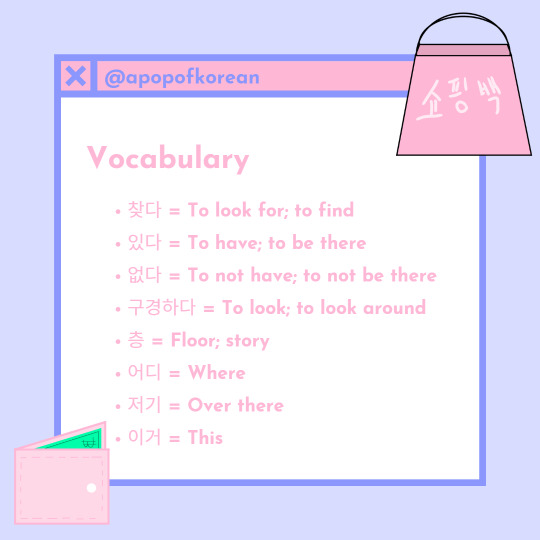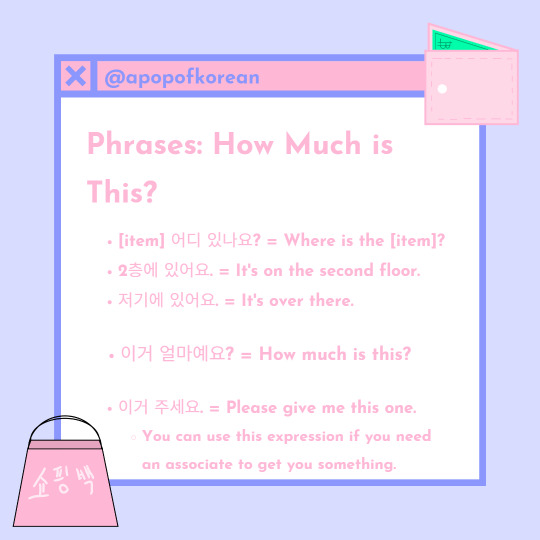Note
how do i go back to studying spanish after feeling depressed for a while? idk if i should review or what i should do i feel stuck
I find the easiest way to get myself back into Spanish is to review the fundamentals and work my way up. In my case it's usually reviewing the irregular verbs and stem-changing verbs and then sometimes making flashcards to make myself feel like I'm being productive
Sometimes I also take other people's little courses on memrise for flash cards
Or I do a deeper grammar review following the Bowdoin University Spanish page
Or, and this is me being advanced so I don't recommend it if you're not more advanced, I look up the grammar articles on the RAE, Fundeu, or Hispanoteca
I would also recommend checking out the WordReference forums for Spanish because there are lots of entries of people in real time asking/answering grammar questions
72 notes
·
View notes
Text
Semester in SK: Shopping Phrases
안녕하세요 여러분! I posted this list of shopping phrases on my Instagram that have been helpful during my semester in Korea so far, so I wanted to share it here as well! I hope you all find it useful as well! 화이팅!









My masterlist
Join my Discord chat here to practice Korean with others!
Follow me on Instagram here for more Korean content!
Get Drops Premium using my affiliate link to expand your Korean vocab!
Check out my Ko-Fi to support this blog and my studies! Thank you for your generosity!
#korean#korean language#hangul#korean vocab#korean vocabulary#korean grammar#study korean#studying korean#learn korean#learning korean
102 notes
·
View notes
Text
This might be a very niche take but I think we should take people's reasons for learning a language in mind when suggesting how they go about it
I've seen people in a lot of Japanese learning communities tell other to never watch fantasy anime (or anime at all sometimes) or read anything that's not slice-of-life or actual literature because "people in real life don't speak like that"
And while, yes, that's true, native Japanese speakers do not generally speak like anime characters, uhhhh... The probability of me watching a fantasy anime in the course of a month is significantly higher than the probability of me going to Japan in the next five years. So understanding anime character speech is in fact more relevant to me than, idk, business lingo
And, I don't think that's a bad thing personally? Learning a language because you want to better understand content you find fun is just as good a reason as learning it to live in the country where the language is spoken, and it's fine and reasonable to adjust your learning strategies according to your personal goals
1K notes
·
View notes
Text
If you’re learning Japanese and have a mailing address in the USA or Canada you can request a free online library card from the Japan Foundation and access their catalog via Libby. For the USA this process is completely online, unsure for Canada
They don’t have a large selection of books in Japanese at the moment, their fiction section is largely translated materials, but they do have a lot of Japanese textbooks and JLPT study books available.
224 notes
·
View notes
Text

Not a name but I just LOVE stuff like this :) An adorable interpretation of the character 鳥 (tori or chō), meaning bird.
Here's how the character may have evolved over time:

Also important to know: in a food context, 鳥 means chicken. There is also a character that specifically refers to chicken: 鶏, which is also read tori when referring to chicken meat (or 鶏肉 toriniku). For live birds, it's read niwatori,* and its on-yomi is kei, as in the chicken and rice dish 鶏飯 keihan.
*A good mnemonic for this is garden bird! 庭 niwa means garden or yard, so that makes the bird in your garden a 鶏 niwatori. It's also part of a famous tongue twister:
庭には鶏が2羽いる
niwa ni wa niwatori ga niwa iru
There are two chickens in the yard.
And if you're fucking awesome at tongue twisters (like I am!!!), here are some trickier versions. (And there's more here.)
裏庭には2羽、庭には2羽、鶏がいる
ura-niwa ni wa niwa, niwa ni wa niwa, niwatori ga iru
There are chickens, two in the backyard and two in the yard.
庭には鶏、裏庭にはワニ
niwa ni wa niwatori, ura niwa ni wa wani
There are chickens in the yard and an alligator in the backyard.
443 notes
·
View notes
Text
So I found out a couple days ago that I’m probably moving to Korea around March? I was planning to *maybe* move late next year sometime so having that schedule moved up so much is a little jarring.
This means that my priority is now improving my Korean rather than improving all 4-6 languages at once. I’ll still do a little studying for each regularly, but I have so many Korean textbooks to go through and so little time.
Maybe I’ll make my goal for next year to reach 5급. I’m currently 3급 and in desperate need of reviewing old materials since it’s been a good while. Last time I was in Korea, my social anxiety was extremely bad so I got barely any speaking practice. Not anymore! I’m determined to go out of my comfort zone to improve.
화팅!
0 notes
Text
December 3 language update
I have three things to finish by the end of the year: my french course, my beginner’s japanese course, and my korean textbook. I’ve been working on the french course this week and it’s going really well. I’ll write reviews when I’m finished with all that.
I’ve also been planning my goals for 2023. Since I don’t really know what I’ll be doing next year, it’s kind of difficult to know which goals will be realistic for me. I’m going to find a teaching job in Korea so I’d like to finish all of my physical textbooks/readers before I go since I don’t have to worry about packing my electronic resources.
So far, I’ve come up with a good structure for my monthly plans so that all of my languages get the attention they need without it getting boring. I may need to adjust it a bit though so that darija gets more time.
I don’t really have any plans for lessons with tutors/teachers because I need to save money, but I still have about 20 hours of darija lessons left that I’ve already paid for. I’ve been taking a break from my lessons because I wanted some time to solidify all of the information I’ve already gotten. I feel like I still have so much that I need to memorize and organize, so it will be a little while before I start those again. I have been using Glossika to practice/study darija and it has really helped me pick up the language easier.
That’s all for now <3
#goals#language learning#foreign languages#about me#darija#korea#langblr#languages#japanese#italian#spanish#french
1 note
·
View note
Text
For those of you studying Spanish (or those who just like to read): just in case you don’t know about it, I want to make sure everyone’s heard of Biblioteca Digital Ciudad Seva – they have tons of classic short stories, both from the Spanish speaking world and translated into Spanish. They also have poetry and theatre. This resource is what I used in undergrad to access texts for class but really there are so many great texts here, so be sure to check it out!
161 notes
·
View notes
Photo

montclair state university, 2016
692 notes
·
View notes
Text
the universal experience of reading texts in another language is mentally buffering every time you come across a number written in digits
531 notes
·
View notes
Text
Duolingo just described “つ” as “tsu, like in catsuit” and as much as I hate to admit it they’re 100% right.
380 notes
·
View notes
Text

IG: ousíapoeticaok
893 notes
·
View notes
Text
The relative pronoun lequel
You use the relative pronoun lequel and its other forms (see below) when talking about things and people, but there has to be a preposition in front of it!
lequel: masculin, singulier
laquelle: féminin, singulier
lesquels: masculin, pluriel
lesquelles: féminin, pluriel
C'est la maison dans laquelle il y a une petite fille.
->laquelle = la maison
C'est le banc sous lequel il y a un petit oiseau.
->lequel = le banc
Il y a deux maisons entre lesquelles on trouve un arbre.
-> lesquelles = les maisons (f, pl)
Il y a deux bancs derrière lesquels on trouve une maison.
->lesquels (m, pl) = les bancs
prépositions:
sur, sous, entre, derrière, devant, dans, ...
Attention: prépositions avec de/ à
du
de + lequel = duquel
de +lesquels/lesquelles = desquels/desquelles
C'est la maison à côté de laquelle il y a une petite fille.
C'est le banc à côté duquel il y a un petit oiseau.
Il y a deux maisons à côté desquelles...
Il y a deux bancs à côté desquels..
Same goes for à:
à + lequel= auquel
à + lesquelles/ lesquels = auxquelles/ auxquels
Let me know if there are any mistakes! Grammar masterlist
86 notes
·
View notes
Text
i have no idea how to structure this post but i wanted to let any language learners following me to know about pronunciator! it's a programme i just found out our local library gives us access to, but i think that you can also register for it on your own. it has a massive number of courses for over 160 languages—even kurdish, which is really hard to find courses on! some other languages they have that i saw just from a quick glance at their languages page are armenian, mexican sign language, hmong, and amharic. i don't have a catchy tagline here, i just think you should consider looking into if you can use it.
975 notes
·
View notes
Text
if you’re learning a language you’re either “I have the vocabulary of a pretentious old literature professor but grammar is a sinful mistress who shall never cross the threshold of my house” or you’re “I only know what ‘strawberry’ and ‘to go’ mean but by ye gods I can make them jump through conjugation hoops and declension parcours that would peel the socks off your feet”. no in between
1K notes
·
View notes
Text
Best language learning tips & masterlists from other bloggers I’ve come across
(these posts are not my own!)
THE HOLY GRAIL of language learning (-> seriously tho, this is the BEST thing I’ve ever come across)
Tips:
Some language learning exercises and tips
20 Favorite Language Learning Tips
what should you be reading to maximize your language learning?
tips for learning a language (things i wish i knew before i started)
language learning and langblr tips
Tips on how to read in your target language for longer periods of time
Tips and inspiration from Fluent in 3 months by Benny Lewis
Tips for learning a sign language
Tips for relearning your second first language
How to:
how to self teach a new language
learning a language: how to
learning languages and how to make it fun
how to study languages
how to practice speaking in a foreign language
how to learn a language when you don’t know where to start
how to make a schedule for language learning
How to keep track of learning more than one language at the same time
Masterposts:
Language Study Master Post
Swedish Resources Masterpost
French Resouces Masterpost
Italian Resources Masterpost
Resource List for Learning German
Challenges:
Language-Sanctuary Langblr Challenge
language learning checkerboard challenge
Word lists:
2+ months of language learning prompts
list of words you need to know in your target language, in 3 levels
Other stuff:
bullet journal dedicated to language learning
over 400 language related youtube channels in 50+ languages
TED talks about language (learning)
Learning the Alien Languages of Star Trek
.
Feel free to reblog and add your own lists / masterlists!
17K notes
·
View notes
Text
My favourite thing about (most) Germanic languages:
Norwegian: due (pigeon), drue (grape)
Danish: due (pigeon), drue (grape)
Swedish: duva (pigeon), druva (grape)
Dutch: duif (pigeon), druif (grape)
Afrikaans: duif (pigeon), druif (grape)
Frisian: duif (pigeon), druif (grape)
German: Taube (pigeon), Traube (grape)
A few notable outliers: English, Scots, Icelandic
#foreign languages#languages#langblr#language learning#German#germanic languages#norwegian#danish#swedish#afrikaans#frisian#dutch
10K notes
·
View notes